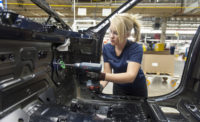The facility, which will stretch across 12 kilometers of public roads, will be equipped with sensors throughout the site, along with high-accuracy location systems, and a data management and control center to monitor prototype vehicles.
It will feature smart junctions, connected roads, autonomous parking and electric vehicle charging, as well as links to a 450-kilometer stretch of connected highway. In addition, a managed air traffic corridor for unmanned aerial vehicles will stretch west from Shannon Airport along the Shannon Estuary.
“The smart city zone provides a first-class facility for global companies to work together and develop world-leading technology, from autonomous vehicles to connected infrastructure,” says Russell Vickers, CEO of FMCI. “The testbed provides an opportunity to test in the real world and help answer some of the questions posed by the future of mobility in a collaborative and efficient way.
“Technologies enabling self-driving vehicles are maturing rapidly and innovations in this space are not exclusively driven by giant automakers,” notes Vickers. “Solutions to maximize growth opportunities arising from the transformation that technology is undergoing in the mobility sector require a hybrid of expertise across the business and research communities.
“No one company has the bandwidth for end-to-end solutions,” explains Vickers. “It is not possible to test in-house innovations in a silo without engaging with other business partners who deliver innovations in other parts of the business model. For example, software developers in the automotive industry need to work with communication, cybersecurity and sensor experts.”
Jaguar Land Rover (JLR) is serving as lead partner of FMCI and will collaborate with other companies such as Cisco, Renovo, Seagate Technology and Valeo.
"This partnership with FMCI provides us with a real-world facility to trial our emerging autonomous, connected, electrified and shared technology in a strategic location,” says John Cormican, general manager for JLR’s software hub in Shannon. “Collaborating with top-tier software companies will allow us to develop our future systems more efficiently.”
“Naturally, the future of self-driving vehicles depends on advances in artificial intelligence (AI), but advanced AI isn’t the only thing autonomous vehicles need,” adds Ken Claffey, vice president and general manager of enterprise data solutions at Seagate. “The sensors used by autonomous vehicles generate massive amounts of data—between 5 and 20 terabytes per vehicle per day.
“This data must be available to the AI technology onboard each vehicle, but also in edge data centers where future analysis must be performed as fast as possible,” claims Claffey. “That is why efficient and intelligent data infrastructure is so important.
“Managing and orchestrating the massive data flows created by autonomous vehicles requires solutions that are as mobile, intelligent and agile as the data itself,” explains Claffey. “We are excited to collaborate with FMCI to help pave the way to innovation in autonomous and connected technology.”







